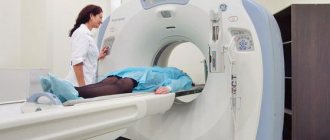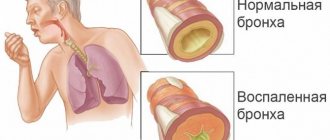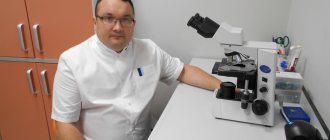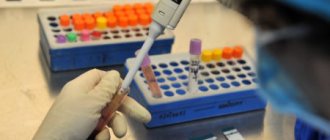Functional diagnostician (ECG doctor) are specialists whose responsibilities include examining all organs and systems in the human body. To make a reliable diagnosis in Moscow, functional diagnostic methods are very important. Based on the results obtained, the patient is subsequently prescribed treatment.
What does a functional diagnostician do?
The methods used in functional diagnostics are aimed at identifying all deviations in the functional state of a person, his vital organs and systems. Functional diagnostic specialists help:
- accurately diagnose
- determine the stage of development of the pathology,
- to develop an appropriate optimal scheme for further treatment in Moscow, which is built taking into account the individual characteristics of the patient.
The effectiveness of treatment largely depends on how accurately the functional diagnostician or ECG doctor made the diagnosis, i.e., how quickly the patient’s condition improves, how quickly he recovers. The functional diagnostician is thus entrusted with solving a rather complex problem.
Special methods help him in this, which are called functional diagnostic methods. In Moscow, a wide variety of diagnostic tools are used, ranging from patient interviews to the use of advanced and functional equipment and methods:
- 24-hour Holter monitoring;
- bicycle ergometry;
- phonocardiography;
- echocardiography (EchoCG);
- rheography;
- spirography;
- Ultrasound and others.
In what cases should you contact a functional diagnostician?
An ECG doctor in Moscow is sent if it is necessary to confirm or make a diagnosis using instrumental functional diagnostic studies. This applies to all human systems and organs. It should be noted that unclear symptoms are not always a manifestation of emerging pathologies, which also makes it possible to identify a functional diagnostician working in clinics and hospitals in the city, in offices equipped with modern equipment.
Functional diagnostics are especially important for monitoring the development of children and adolescents. For healthy people, visiting a doctor with an ECG allows you to determine the functional reserves of the body, especially its breathing and blood circulation. In this case, diagnostics is carried out in order to predict and control a person’s ability to individually adapt to different environmental conditions, especially to extreme ones, for example, sports and professional stress, participation in polar expeditions, underwater work, etc.
How to become a functional diagnostician?
In Moscow, many educational institutions train specialists who can later become functional diagnosticians, including:
- MMA im. I. M. Sechenov;
- MGMSU;
- RGMU;
- RNIMU named after. Pirogov;
- Moscow Medical and Surgical Academy and others.
Having completed training at diagnostic departments, a specialist will be able to give an objective assessment of the patient’s condition, detect deviations, and establish the degree of dysfunction of his organs and systems, guided by the results of instrumental or laboratory studies.
Famous specialists who worked in Moscow
The development of functional diagnostics was a consequence of the emergence of a special direction in medicine - physiological - and the practical expression of this direction. It became established at the end of the 19th and beginning of the 20th centuries with the advent of the works of great scientists and talented doctors. In Moscow, the development of functional diagnostics occurred thanks to the work of Belousov, Zenkov, Ronkin, Vinogradova, Sokolov, Minushkin and many others.
The human body is a complex system in which everything is interconnected, and deviations and malfunctions in the functioning of an organ lead to problems and changes in others. This functional interaction has a serious impact not only on the general state of health, but also on the course of diseases, especially if the disease has become chronic and all tests are normal. At the same time, the person’s condition can hardly be called satisfactory; he feels constantly unwell.
To find out why some organs do not cope with their work fully, cannot adapt, or are destroyed under the influence of pathogenic processes, people turn to a diagnostic doctor
.
Who is a diagnostician?
Quite often, a patient to whom a therapist or some other medical specialist writes a referral for diagnostics
, wonders why the therapist himself cannot make a diagnosis and wonders who this diagnostician is.
To obtain a specialization as a diagnostician, a doctor or a student completing his education must undergo training in the specialization “functional diagnostics”. And also be able to apply in practice the knowledge and skills acquired during the training process. After completing training and having a certain amount of experience in the chosen specialty, the doctor is assigned a qualification category.
What does a diagnostician do?
The Department of Functional Diagnostics is engaged in a comprehensive and thorough study of human organs or entire systems to identify possible pathologies at the earliest stages, in order to find possible malfunctions and disturbances in the functioning of the body, before clinical manifestations and obvious disturbances in the functioning of the body appear. The diagnostician conducts:
- examination of a patient from a so-called risk group or with a hereditary predisposition in order to identify the disease in the initial stages and prevent its development;
- identifies and evaluates functional changes in the functioning of organs and their anatomical features;
- examines changes in the body’s condition, its improvement or deterioration during treatment;
- conducts various tests, both stress and drug tests, and measuring function to select the most effective treatment methods;
- determines how effective the therapist’s prescriptions are;
- conducts necessary examinations of patients before surgical interventions;
- conducts a medical examination.
The doctor also issues an opinion, advises doctors on issues related to his specialization, and participates in medical commissions to consider particularly complex cases of disease.
What diseases does a diagnostician treat?
A doctor engaged in functional diagnostics does not conduct direct treatment, does not prescribe a therapeutic course of medications, and does not perform surgical interventions. He studies the systems of the human body, and these can be various examinations, including:
- assessment of external respiration parameters in various lung diseases or suspected functional changes;
- functional diagnosis of cardiac problems;
- diagnosing the functions of the digestive system;
- checking how efficiently the kidneys and the entire urinary system are working;
- examination of female genital organs and mammary glands as prescribed by a gynecologist;
- endocrine system research;
- diagnostics of the central nervous system.
To a diagnostic doctor
Usually the patient is referred by a general practitioner or medical specialist - endocrinologist, urologist, pulmonologist, gynecologist, cardiologist, neurologist.
The doctor conducts an examination, with the help of which he can either confirm the diagnosis with which the patient was sent for examination, or recommend that the doctor who referred the patient to him make certain adjustments to the treatment plan, based on functional diagnostic data. The final diagnosis is made by the patient’s attending physician, taking into account all the data on the patient’s condition and the dynamics of the disease, diagnostic data, and the results of all necessary tests. It must be understood that all functional studies only help in accurate diagnosis or determination of whether the disease is developing or recovery is occurring, but are not treatment in themselves.
When should you get diagnosed?
It’s good when a person understands that his health is of great value, and his condition needs to be taken care of, not undermine it with bad habits, not expose himself to unnecessary and unjustified risks, and regularly visit doctors, and ideally, undergo a full medical examination, including comprehensive diagnostics.
In this case, it is clear that the diagnosis is carried out during a general examination; as a rule, such a medical examination is recommended once a year, if there are no health problems, and twice a year to visit a doctor who specializes in the treatment of an existing chronic disease. But usually the patient comes to the diagnostician’s office
by referral when the attending physician has discovered obvious signs of the disease and needs confirmation of research to draw up an accurate treatment plan.
In addition, there are still certain moments when you should undergo a health check. Quite often, people go on long business trips, work in rotation, go to study in another city, go on vacation to other countries, especially when traveling to countries where the climate and living conditions differ sharply from those familiar to the human body.
Before going for treatment to a sanatorium or, for example, a balneological resort, you also need to undergo a diagnosis, because, perhaps, the procedures that will be offered in the sanatorium will not only not help a person, but may even cause harm.
If you decide to play sports or visit a fitness center, diagnostics
won't hurt either.
Recently, more and more young couples who have decided to become parents are approaching this issue consciously and quite seriously. Comprehensive diagnostics will help identify existing problems and correct them with medication or surgical treatment, if indicated. All diseases and disorders in the functioning of body systems are much easier to prevent or cure in the initial stages of the disease, especially since modern technologies and excellent diagnostic equipment that allows one to achieve good results in identifying problems make it possible to identify all possible abnormalities in the body at a very early stage.
In the human body, everything is interconnected; if the function of one organ is disrupted, the work of many other organs and systems changes. Functional connectivity affects not only the state of health, but also the course of the disease; information about this is especially important in the chronic form of the disease, when test results are within the normal range, but the person still feels unwell. A functional diagnostics doctor helps to find out how organs cope with their functions, their adaptive capabilities, resources and the mechanism of development of pathology.
Diagnostic doctors in Kyiv: consultation with the best diagnostician, make an appointment online, reviews
A diagnostician is a general specialist who examines the entire body to detect pathological foci. The specificity of its activities makes it possible to diagnose any pathology. Through diagnostics, the condition of all organs and systems of the body is analyzed, which makes it possible to select effective drug therapy as accurately as possible or establish indications for surgical intervention.
Research methods are divided into basic (analysis of complaints, visual inspection, percussion, palpation, auscultation) and special. The diagnostician receives objective information about the condition as a result of special diagnostics (ultrasound examination, radiography).
Sign up for a consultation with a diagnostician
In most cases, a consultation with a diagnostician is prescribed by specialists to confirm the diagnosis. A consultation with a diagnostician allows you to clarify the location, size, density of the pathological focus, assess its prevalence, and the degree of organ damage. An appointment with a diagnostician can be made on the portal likarni.com after first familiarizing yourself with the services of doctors and patient reviews. If you have any difficulties or questions, you can contact the call center consultants for help.
How does an appointment with a diagnostician proceed?
An appointment with a diagnostician begins with asking the patient about clinical symptoms, medical history, life, profession, and the presence of addictions. Then the diagnostician determines diagnostic tactics that will help identify the pathology. The patient is prescribed certain diagnostic procedures necessary to assess his health status. For this purpose, computed tomography, magnetic resonance imaging, ultrasound, electrocardiography, echocardiography, contrast radiography, endoscopic examinations with biopsy are performed. Laboratory examinations include blood, urine, cerebrospinal fluid, feces, examination of smears, scrapings, histological and cytological examination.
What does a diagnostician diagnose?
Among the diseases that a diagnostician diagnoses, it should be noted neurological (cysts in the brain), endocrine pathologies (pheochromocytoma, nodules in the thyroid gland), diseases of the genitourinary (prostatitis, cystitis), cardiovascular (arrhythmias, defects), respiratory systems (pneumonia), diseases of the digestive tract (cholelithiasis, gastric ulcer), musculoskeletal system (osteoporosis, herniated discs), ENT organs (sinusitis).
Children's diagnostician
A pediatric diagnostician assists in identifying pathologies of the digestive (gastritis), genitourinary tract (ovarian cyst, varicocele), respiratory (bronchitis), cardiovascular (cardiac defects), nervous systems, endocrinological organs, musculoskeletal tract, ENT organs . For diagnosis, a pediatric diagnostician uses laboratory methods and ultrasound. Depending on the age of the child and the severity of the condition, radiography, endoscopic techniques, magnetic resonance imaging, and computed tomography are used.
likarni.com
Who is a Functional Diagnostics Doctor?
If a patient is given a referral for diagnostics, he often wonders, what is the difference between the specialist who will conduct the examination and the therapist and who is the functional diagnostics doctor?
A diagnostician is a specialist with a higher medical education and postgraduate training in the specialty “Functional Diagnostics”. The doctor must have the following knowledge and skills, applying them in practice:
- Basic legislation of the Ministry of Health and all documents regulating the activities of a medical institution.
- Etiology, pathogenetic mechanism of development of pathological processes, clinical symptoms and specificity of the course and development of diseases. All laws of normal and pathological physiology, methods of systemic analysis of physiological functions.
- Rules and techniques for identifying general and specific symptoms of major diseases.
- Clinical manifestations, symptoms of emergency conditions and methods of providing assistance.
- Principles of complex therapy of major pathologies and diseases.
- General principles and fundamental principles, methods and methods of clinical, laboratory, instrumental diagnostics of the functions of organs and systems of the human body.
- Rules for determining the basic functional methods and methods of examining a patient to clarify the primary diagnosis.
- Classification and criteria for metrological characteristics of the equipment used.
- General rules for the organization and instrumental equipment of the functional diagnostics department.
- Rules and regulations for the preparation of relevant medical documentation and reporting.
A functional diagnostics doctor may have qualification categories - second, first and highest.
What is the difference between a functional diagnostician and a therapist?
Many patients are confused by the situation when the attending physician or therapist refers him to a functional diagnostics doctor for examinations. This fact usually causes bewilderment, since, in fact, the therapist himself must be a diagnostician; he identifies and records the presence of various diseases. In addition, a functional diagnostician, like a therapist, specializes in the health of the entire human body as a single system.
However, there are serious differences in their qualifications and work methods. Firstly, a diagnostician can be considered such only after additional training and practice (residency) in this specialty, in addition to higher medical education. Secondly, this doctor, unlike a therapist, is not involved in prescribing treatment. Specifically, his “element” is precisely the study of the functional characteristics of the body, the analysis and clinical interpretation of the data obtained, and the giving of conclusions based on them. The diagnostician can consult the attending physician and take part in the development of a treatment regimen. Thirdly, the diagnostician not only determines the methods and procedure for examining a particular patient, but can also independently carry out certain types of diagnostics using special medical equipment. In addition, the diagnostician’s knowledge of the technologies used to examine the patient is deeper and more specific.
A doctor, depending on his merits, knowledge and skills, may be assigned the following qualification categories:
- second;
- first;
- highest.
When should you contact a Functional Diagnostics Doctor?
Ideally, every reasonable person should understand the full value of their main resource - health, and regularly undergo medical examinations, including a comprehensive examination of the functions of organs and systems. If this is carried out, the question “when should you contact a functional diagnostics doctor” simply will not arise. Unfortunately, most often patients end up in the diagnostic room on the direction of the attending physician, that is, when the first symptoms of the disease already appear.
- Before you go on a long trip, especially to countries with climates and conditions that are unusual for the body.
- In advance, before carrying out various health activities - a trip to resorts, sanatoriums, and so on (often functional diagnostics and other studies are mandatory).
- Before starting sports or fitness.
- A comprehensive examination is necessary for those who adhere to conscious parenthood and conception.
Such preventive measures help to assess the level of functioning of internal organs and systems interconnected with them, as well as eliminate the risks of possible complications and exacerbations. In the case of conceiving a baby, a functional examination of both parents will help to correct the health status and wisely plan the birth of the desired baby.
What tests should be taken when contacting a Functional Diagnostics Doctor?
As a rule, a function study is carried out when the patient already has clinical manifestations of a particular disease. What tests to take when visiting a functional diagnostics doctor is decided by the attending specialist; it all depends on the patient’s condition and the form of the pathology - acute, chronic or initial stage. It happens that functional studies are carried out before laboratory tests or in parallel with them.
There are several types of functional methods that actually require preliminary analyses, for example:
- Assessment of external respiration function - diffusion capacity of the lungs. It is necessary to donate blood to determine the level of hemoglobin.
- Bicycle ergometry requires a preliminary electrocardiogram and echocardiography.
- Transesophageal echocardiography – results of FGDS are needed.
- Spirography requires fluorography and x-ray of the lungs.
Tests and special preparation are not required for the following types of studies:
- Ultrasound of the thyroid gland.
- Ultrasound of lymph nodes.
- Ultrasound of the salivary glands.
- Duplex ultrasound of cervical vessels.
- Duplex ultrasound scanning of the vessels of the upper and lower extremities.
- Echocardiography.
The diagnosis is made based on the analysis of all diagnostic information, so it is impossible to say which is more important. All types of examinations are significant and assess the condition of the body according to the task set by the doctor.
What diagnostic methods does the Functional Diagnostics Doctor use?
The main methods of examining functional diagnostics can be divided into 5 categories:
- ECG - clinical electrocardiography:
- Monitoring of 24-hour electrocardiography.
- Stress tests.
- Vectorcardiography.
- Pericardial mapping.
- Phonocardiography.
- Determination of heart rhythm variations.
- Functional state of external respiration:
- Inhalation provocative tests.
- Graphic registration of changes in lung volume - spirography.
- Assessment of the degree of airway obstruction - peak flowmetry.
- Assessment of the functional state of the lungs - body plethysmography.
- Assessment and analysis of the functional state of the nervous system (central and peripheral):
- EEG - electroencephalogram.
- Determination of the causes of sleep disturbances, apnea syndrome - PSG or polysomnography.
- EP – evoked potentials of the brain.
- Electromyography.
- TMS – transcranial magnetic stimulation.
- Echoencephalography.
- VKSP is a method of evoked cutaneous sympathetic potentials.
- Functional tests.
- Ultrasound of the heart - echocardiography.
- Assessment of the state of the vascular system:
- Rheography.
- Oscillography.
- Dopplerography.
- Phlebography.
- Vaginography.
- Load test method.
It is quite difficult to answer the question of what diagnostic methods a Functional Diagnostics Doctor uses, since this area of medicine is developing very intensively and every year is replenished with new, more advanced and accurate methods for the early detection of pathologies. Also, the choice of method is directly related to the organ, system, and their functional relationship.
In addition to the above methods, doctors also use the following:
- Dopplerography of the heart.
- TPS – transesophageal pacing.
- Variation pulsometry.
- Bicycle ergometry - ECG with stress.
- Thermal imaging diagnostics.
- Pneumotachometry.
- Rheoplethysmography.
- Doppler vasography of the brain.
- Duplex, triplex ultrasound diagnostics of vessels (arteries, veins).
- Acoustic impedance measurement.
- Endoradiosounding.
What examination methods does the doctor use in his work?
The main activity of this specialist is the diagnosis of any pathological conditions and deviations in the functioning of the human body. In his work he uses all the modern achievements of medical science, computer technology, biology, anatomy, chemistry, radiology, and physics.
If your attending physician or specialist has not previously prescribed any examinations, you should prepare before visiting the doctor. For example, it is recommended to undergo a general blood test with mandatory determination of hemoglobin levels, undergo electrocardiography and echocardiography procedures, undergo fluorography and fibrogastroduodenoscopy. Similar tests and examinations can be carried out in parallel with the process of functional diagnostics.
Special preparation and preliminary tests are not required before performing an ultrasound of the thyroid gland, lymph nodes and salivary glands, echocardiography, or duplex ultrasound scanning of the vessels of the extremities.
When a patient first sees a functional diagnostician, the doctor first conducts a survey and examination of the patient, during which, using his own knowledge, experience and skills, he studies and analyzes the information received. During the interview, he manages to find out the subjective manifestations of the disease, which became the reason for contacting a doctor, while during the examination he receives objective information about the symptoms of the disease (changes in pulse, temperature, test results, and other factors). When examining the patient, the doctor pays attention to the appearance of the skin and mucous membranes, examines the condition of the mouth and eyes, palpates the abdominal cavity and lymph nodes.
The main diagnostic methods used by a doctor can be divided into the following types: clinical electrocardiography (this includes stress tests, vectorcardiography, phonocardiography and some other techniques); study of the functional state of external respiration, which consists of conducting inhalation provocative tests, assessing the degree of airway obstruction and the functional state of the lungs; assessment and analysis of the state of the nervous system - for this, the patient undergoes an electroencephalogram, electromyography, functional tests, transcranial magnetic stimulation; echocardiography; study of the state of the vascular system through rheography, oscillography, Dopplerography, phlebography, and stress testing.
There are also more specific examination methods, for example, cardiac Dopplerography, transesophageal cardiac pacing, variational pulsometry, pneumotachometry, rheoplethysmography, endoradiosounding.
Many of these techniques are completely unfamiliar to the average person, and even therapists and specialists cannot always say for sure when they should be carried out. This is the value of a functional diagnostics doctor - he knows exactly what examinations can be used to obtain information, for example, about the level of vascular tone, phases of the cardiac cycle, venous and arterial pressure, and how to then use it for the benefit of the patient.
Functional diagnostics is a branch of medicine that is responsible for the study of pathological conditions of organs and systems in the human body, features and disorders in their work. The information obtained in the process of applying the practical principles and methods of this medical field is of enormous importance for the entire treatment process, because the diagnosis is often based on the data of a diagnostic examination. That is why the importance of the medical activity of a functional diagnostician is difficult to overestimate.
A diagnostician is a specialist who examines all organs and systems of the human body to make a reliable diagnosis, on the basis of which the patient will be treated.
Now a diagnostician
This is an independent specialty, although diagnosing diseases is the responsibility of all specialized specialists. Typically, the attending physician diagnoses general diseases in his own office, but if additional examination is necessary, the patient may be referred to a diagnostician.
What does a Functional Diagnostics Doctor do?
The main task of the doctor in the department of functional diagnostics is to conduct a thorough and, if possible, comprehensive examination with the aim of early detection of pathology, that is, to study the condition of an organ or system, to exclude or identify a possible disorder before the development of obvious clinical symptoms and changes in the body.
What does a functional diagnostics doctor do step by step?
- Examination of patients at risk to detect the disease at an early stage and prevent its development.
- Identification and assessment of anatomical and functional abnormalities in the functioning of organs and systems at various stages of the disease.
- An examination aimed at dynamic monitoring of changes in the state of the body during therapeutic measures.
- Carrying out tests - stress, medication, functional for an adequate selection of effective therapy.
- Evaluation and analysis of the effectiveness of therapeutic prescriptions.
- Examination of patients before planned and unplanned surgery.
- Dispensary examinations.
In addition, the doctor draws up and issues conclusions with the results of examinations, participates in collegial reviews of complex clinical cases, advises colleagues on issues of his specialization - functional diagnostics, constantly masters the latest developments, methods and equipment, takes part in specialized events (courses, forums, congresses) ).
Diagnosis of cardiovascular diseases
Diagnosis of the type, characteristics and prognostic quality of diseases of the cardiovascular system is carried out using functional research methods. This is especially important due to the steadily increasing number of patients suffering from this pathology in recent years, especially at a young age. The use of non-invasive examination methods such as daily monitoring of ECG and blood pressure, stress tests with physical activity (treadmill test or bicycle ergometry) will allow us to identify early signs of serious cardiovascular diseases or exclude them, and in patients taking constant drug therapy - to adjust treatment . Early detection of pathology, which continues to rank first among fatal diseases, means early treatment and, accordingly, prolongation and improvement of life comfort.
What diseases does the Functional Diagnostics Doctor treat?
A functional diagnostics doctor does not treat and does not prescribe drug therapy; he has a different task. If the question arises about what diseases the doctor treats, then the question is rather about what organs and systems he examines. These may be the following types of examinations:
- Examination and assessment of external respiratory functions
- Cardiological functional diagnostics.
- Functional diagnostics of the digestive organs.
- Functional diagnostics of the kidneys.
- Endocrinological functional examination.
- Gynecological functional diagnostics.
- Neurological functional diagnostics.
As a rule, the patient enters the functional diagnostics office on the direction of the attending physician - a therapist or a doctor of narrow specialization. A functional diagnostics doctor conducts an examination in order to clarify, correct, and confirm the preliminary diagnosis determined earlier. The diagnosis is made based on an analysis of all the results, thus, a functional study is an aid in diagnosis, and not a treatment for the disease.
Functional diagnostics is a completely safe and painless type of examination. Before each procedure, the doctor conducts a conversation with the patient, explaining the essence of the method and how the process will occur. This not only reduces the patient’s anxiety, but also helps to qualitatively assess the functional state of the body, because highly sensitive devices are sensitive to any vegetative changes on the part of the person being examined. In this regard, in addition to the basic recommendations for preparation, almost all diagnosticians advise the patient to exclude any provoking factors, both physical and emotional. Specific preparatory rules also exist, they depend on which body will be assessed and in what way. During some procedures it is not recommended to eat food, while during others there are no such restrictions.
Not only doctors of the department of functional diagnostics, but also all other specialists related to medicine are adherents of preventive, early detection of pathologies, since such timely assessment of the functioning of human organs and systems makes it possible to identify the disease and stop it at the initial stage of development.
Advice from a functional diagnostics doctor
, first of all, relate to the well-known saying “Bene dignoscitur bene curatur”, which in translation means - well defined, means well treated. A comprehensive study of the functions and resources of systems and the state of organs is necessary not only for those who are already ill, but also for those who are classified as relatively healthy people. Modern technologies, methods and advanced diagnostic equipment make it possible to identify minimal, initial changes and disorders at the functional level with maximum accuracy, which means a unique opportunity for quick and effective treatment.
Diagnostics carried out using special medical equipment are called functional if they provide an explanation for certain disorders of the internal organs. This examination applies to both acute and chronic pathologies. A specialist who knows how to use special equipment and can issue an intelligent conclusion with a detailed explanation, assesses the condition of the systems and the features of their operation. A functional diagnostician will find an explanation for certain symptoms through a detailed examination of the organs.
Lung examination with drugs
It is performed for all patients with shortness of breath of unknown origin, difficult, noisy or wheezing breathing, or prolonged chronic cough. A functional examination of the lungs is recommended for patients with frequent bronchitis, bronchial asthma, chronic obstructive pulmonary diseases, and allergic rhinitis. A study of pulmonary function with drugs from the bronchodilator class will allow you to clarify the diagnosis and prescribe adequate treatment in a timely manner. The purpose of such a test is to assess the reversibility of the bronchopulmonary process, which allows the attending physician to select the most effective drugs, as well as assess the dynamics of the disease during treatment.
Functional diagnostics doctor
called a specialist who studies the condition of the patient’s organs and identifies the presence of functional disorders even before the onset of anatomical transformations in the body.
Responsibilities of a functional diagnostics doctor
- Constant control and organization of functional research by department staff;
- Developing reasonable work schedules for yourself and for the nursing staff of the department;
- Management of the work of nursing staff of the department;
- Monitoring the correctness of ECG readings;
- Conducting an analysis of completed studies, as well as developing conclusions on them;
- Organization and implementation of advanced training for department employees;
- Conducting classes on teaching functional diagnostics to clinic doctors;
- Discussion, if necessary, of the results of functional studies with the attending physicians of the medical institution and their consultation on issues of functional diagnostics;
- Increasing your own level of professional qualifications and theoretical knowledge;
- Conducting a systematic analysis and generalization of the department’s experience;
- Ensuring proper maintenance of primary documentation in accordance with approved forms;
- Proper organization of work activities of department personnel with the introduction of work organization measures and the use of the experience of the best medical institutions;
- Timely familiarization of department employees with all official documents (orders and instructions of the administration, methodological recommendations, etc.);
- Compliance with the principles of deontology.
What diseases does the Functional Diagnostics Doctor treat?
A functional diagnostics doctor does not treat and does not prescribe drug therapy; he has a different task. If the question arises about what diseases the doctor treats, then the question is rather about what organs and systems he examines. These may be the following types of examinations:
- Examination and assessment of external respiratory functions;
- Cardiological functional diagnostics;
- Functional diagnostics of the digestive organs;
- Endocrinological functional examination;
- Gynecological functional diagnostics;
- Neurological functional diagnostics;
A functional diagnostics doctor conducts an examination in order to clarify, correct, and confirm the preliminary diagnosis determined earlier. The diagnosis is made based on an analysis of all the results, thus, a functional study is an aid in diagnosis, and not a treatment for the disease.
When should you contact a Functional Diagnostics Doctor?
Ideally, every reasonable person should understand the full value of their main resource - health, and regularly undergo medical examinations, including a comprehensive examination of the functions of organs and systems. If this is carried out, the question “when should you contact a functional diagnostics doctor” simply will not arise. Unfortunately, most often patients end up in the diagnostic room on the direction of the attending physician, that is, when the first symptoms of the disease already appear.
- Before you go on a long trip, especially to countries with climates and conditions that are unusual for the body;
- In advance, before carrying out various health activities - a trip to resorts, sanatoriums, and so on (often functional diagnostics and other studies are mandatory);
- , fitness;
- A comprehensive examination is necessary for those who practice conscious parenting before conceiving.
VIDEO
The main types of functional diagnostic studies performed by a doctor
- Electrocardiography;
- Echocardiography;
- Electroencephalography;
- Spirometry;
- Daily monitoring of blood pressure and ECG;
- Veloegrometry (VEM);
- Impedancemetry;
- Pure tone threshold audiometry;
- Conducting an examination of external respiration functions.
The doctor’s advice on functional diagnostics, first of all, relates to the well-known saying “Bene dignoscitur bene curatur”, which translated means - well defined, means well treated
. A comprehensive study of the functions and resources of systems and the state of organs is necessary not only for those who are already ill, but also for those who are classified as relatively healthy people. Modern technologies, methods and advanced diagnostic equipment make it possible to identify minimal, initial changes and disorders at the functional level with maximum accuracy, which means a unique opportunity for quick and effective treatment.
In the human body, everything is interconnected; if the function of one organ is disrupted, the work of many other organs and systems changes. Functional connectivity affects not only the state of health, but also the course of the disease; information about this is especially important in the chronic form of the disease, when test results are within the normal range, but the person still feels unwell. A functional diagnostics doctor helps to find out how organs cope with their functions, their adaptive capabilities, resources and the mechanism of development of pathology.
Reception features
A consultation with a functional diagnostician in Moscow and the Moscow region will not leave many questions regarding health unanswered. First, the patient will have a conversation with the doctor. Before the questionnaire, the doctor examines the medical history. A visual examination with elements of palpation allows you to identify areas to which a functional diagnostician should pay special attention when using medical equipment. The following systems fall under professional analysis:
- cardiovascular;
- nervous;
- respiratory.
You should not go to an appointment with a functional diagnostician to receive treatment recommendations. This doctor in Moscow and the Moscow region belongs to a group of specialists who study disorders of the body. Only a highly specialized doctor will correctly describe the course of the treatment program. A functional diagnostician often works in tandem with the following specialists:
- cardiologist;
- pulmonologist;
- neurologist.
Based on the results of the examination, the diagnostician issues a general conclusion. In the document, the doctor describes the identified disorders, the stage of the pathological process and reveals in detail the features of the clinical picture. The results will form the basis for making a diagnosis. The price of a comprehensive examination is in the price list of services.
Features of career growth
Functional diagnosticians are required in many medical institutions: clinics, hospitals, sanatoriums, paid medical, diagnostic and scientific-clinical centers. The higher the medical category and experience, the more prospects a specialist has for career growth. In the future, such a doctor can become the head of a similar department and engage in scientific activities.
Functional diagnostician (ECG doctor) are specialists whose responsibilities include examining all organs and systems in the human body. To make a reliable diagnosis in Moscow, functional diagnostic methods are very important. Based on the results obtained, the patient is subsequently prescribed treatment.
What does a functional diagnostician do?
The methods used in functional diagnostics are aimed at identifying all deviations in the functional state of a person, his vital organs and systems. Functional diagnostic specialists help:
- accurately diagnose
- determine the stage of development of the pathology,
- to develop an appropriate optimal scheme for further treatment in Moscow, which is built taking into account the individual characteristics of the patient.
The effectiveness of treatment largely depends on how accurately the functional diagnostician or ECG doctor made the diagnosis, i.e., how quickly the patient’s condition improves, how quickly he recovers. The functional diagnostician is thus entrusted with solving a rather complex problem.
Special methods help him in this, which are called functional diagnostic methods. In Moscow, a wide variety of diagnostic tools are used, ranging from patient interviews to the use of advanced and functional equipment and methods:
- 24-hour Holter monitoring;
- bicycle ergometry;
- phonocardiography;
- echocardiography (EchoCG);
- rheography;
- spirography;
- Ultrasound and others.
In what cases should you contact a functional diagnostician?
An ECG doctor in Moscow is sent if it is necessary to confirm or make a diagnosis using instrumental functional diagnostic studies. This applies to all human systems and organs. It should be noted that unclear symptoms are not always a manifestation of emerging pathologies, which also makes it possible to identify a functional diagnostician working in clinics and hospitals in the city, in offices equipped with modern equipment.
Functional diagnostics are especially important for monitoring the development of children and adolescents. For healthy people, visiting a doctor with an ECG allows you to determine the functional reserves of the body, especially its breathing and blood circulation. In this case, diagnostics is carried out in order to predict and control a person’s ability to individually adapt to different environmental conditions, especially to extreme ones, for example, sports and professional stress, participation in polar expeditions, underwater work, etc.
How to become a functional diagnostician?
In Moscow, many educational institutions train specialists who can later become functional diagnosticians, including:
- MMA im. I. M. Sechenov;
- MGMSU;
- RGMU;
- RNIMU named after. Pirogov;
- Moscow Medical and Surgical Academy and others.
Having completed training at diagnostic departments, a specialist will be able to give an objective assessment of the patient’s condition, detect deviations, and establish the degree of dysfunction of his organs and systems, guided by the results of instrumental or laboratory studies.
Famous specialists who worked in Moscow
The development of functional diagnostics was a consequence of the emergence of a special direction in medicine - physiological - and the practical expression of this direction. It became established at the end of the 19th and beginning of the 20th centuries with the advent of the works of great scientists and talented doctors. In Moscow, the development of functional diagnostics occurred thanks to the work of Belousov, Zenkov, Ronkin, Vinogradova, Sokolov, Minushkin and many others.
A functional diagnostician is a doctor who has the knowledge and practical skills to study the electrophysiological function of the cardiovascular system, external respiration, nervous and muscular systems, hemodynamics and peripheral circulation.
Research methods
Medical (Diamed LLC) is equipped with all the necessary modern diagnostic equipment. Within the walls of the clinic you can do:
- electroencephalography (EEG or echoencephalography);
- electrocardiography (ECG);
- echocardiography;
- Holter ECG;
- daily blood pressure monitoring (ABPM);
- pulse oximetry.
In addition to the basic diagnostic techniques described, various tests are used (hydrogen, treadmill, Holter, etc.). You can go to the medical center for any abnormality, from headaches and pressure changes to suspicion of a progressive tumor process. In each individual case, a functional diagnostician selects methods according to the clinical picture, current diseases, age and health status of the patient. You can make an appointment with a doctor by phone. Contact us at a convenient time and don’t skimp on your own health! The prices for professional medical care will not shock you.
Cost of functional diagnostician services
The prices indicated in the price list may differ from the actual prices. Please check the current cost by calling +7 495 104 8605 (24 hours a day) or at the GMS Hospital clinic at the address: Moscow, st. Kalanchevskaya, 45.
| Name | Common price | Price with 30% discount |
| Initial consultation with a leading specialist | RUB 13,665 | RUB 9,566 |
| Initial appointment with a specialist | RUB 9,565 | RUR 6,696 |
| Repeated consultation with a leading specialist | RUB 11,615 | RUB 8,131 |
| Repeated appointment with a specialist | RUB 8,130 | RUB 5,691 |
| Extended consultation with a leading specialist | RUB 24,605 | RUB 17,224 |
| Extended consultation with a specialist | RUB 17,225 | RUB 12,058 |
Prices for the most popular services are indicated with a 30% discount, which is valid when paying in cash or by credit card. You can be served under a VHI policy, pay separately for each visit, sign an agreement for an annual medical program, or make a deposit and receive services at a discount. On weekends and holidays, the clinic reserves the right to charge additional payments according to the current price list. Services are provided on the basis of a concluded contract.
Plastic cards MasterCard, VISA, Maestro, MIR are accepted for payment. Contactless payment with Apple Pay, Google Pay and Android Pay cards is also available.










